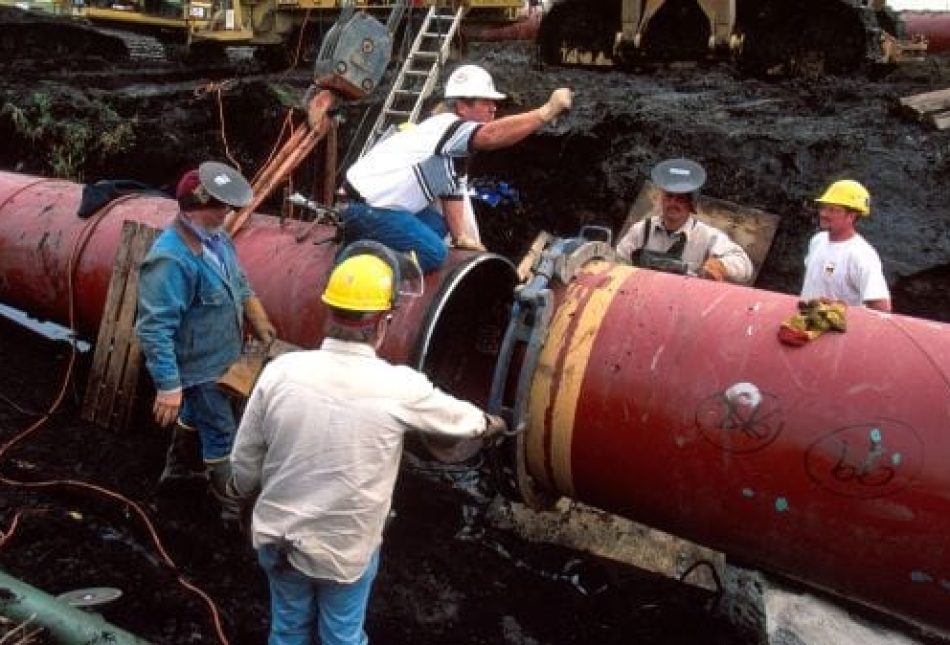Trump’s steel tariffs threaten American energy dominance


U.S. crude oil production just surged to an all-time high of 11.3 million barrels per day. Natural gas production is also setting records. This energy bonanza is creating tens of thousands of new jobs and dramatically reducing Americans’ gasoline and utility bills while boosting New Mexico’s economy and making it the 3rd-biggest oil producer in the nation.
Unfortunately, the energy boom could soon collapse. Constructing new pipelines and wells is becoming prohibitively expensive due to the Trump administration’s tariffs on steel and aluminum. Without continued investment in energy infrastructure, America will never achieve energy independence.
It’s time for the administration to rescind these counterproductive taxes.
In March, President Trump imposed a 25 percent tariff on imported steel and 10 percent tariff on imported aluminum. The levies have hit American energy companies hard. A recent survey by the Dallas Federal Reserve found that two-thirds of energy firms are negatively affected by the tariffs on steel. That’s because steel makes up about 10 to 15 percent of the cost of an oil or gas well. And nearly 80 percent of pipes and other products used by oil and natural gas companies are made with highly customized imported steel that cannot be domestically sourced.
For example, the Houston-based Plains All American Pipeline, which handles five million barrels per day of crude oil and natural gas liquids, projects that the steel tariffs will raise the price of a new pipeline system from the Permian Basin region by $40 million.
The lack of pipeline capacity has made it harder for oil and natural gas to get out of the Permian and to other parts of the domestic market or to the Gulf Coast for processing or export.
At least the higher costs for energy companies have meant higher revenues for American steel and aluminum companies, right?
Actually, no. Plains All American sought out domestic suppliers, but “American mills either did not bid” or “submitted alternative specifications” that failed to meet standards, according to CEO Willie Chiang. In other words, the tariffs aren’t necessarily boosting revenues for domestic steel and aluminum companies.
In fact, some of the largest domestic producers of aluminum and steel, such as Nucor and U.S. Steel, have lost value in the stock market this year — a sure sign that the tariffs aren’t working as intended.
The tariffs aren’t just hurting companies — they’re bad news for regular Americans, who ultimately pay the increased metal costs in the form of higher energy prices. Rob
Thummel, managing director of energy-investment firm Tortoise, explains that oil and gas companies can only eat the higher metal costs for so long. Eventually, “those costs will have to be consumed…more than likely by the consumer.”
Workers are poised to suffer too. The oil and gas industry supports about 10.3 million jobs and contributes more than $1.3 trillion to the American economy. Making energy exploration and production more expensive means fewer new jobs.
The tariffs are even undermining national security by making America more reliant on foreign energy producers. The United States recently surpassed Russia as the world’s top oil producer. And we’ve led the world in natural gas production since 2009. But if it becomes prohibitively expensive to invest in new energy infrastructure, America will lose its dominant position atop the global oil and gas markets.
The Trump administration’s tariffs are backfiring. It’s time to rescind them and deliver much needed relief to American energy producers and consumers.
Paul Gessing is the President of New Mexico’s Rio Grande Foundation. The Rio Grande Foundation is an independent, non-partisan, tax-exempt research and educational organization dedicated to promoting prosperity for New Mexico based on principles of limited government, economic freedom and individual responsibility.
